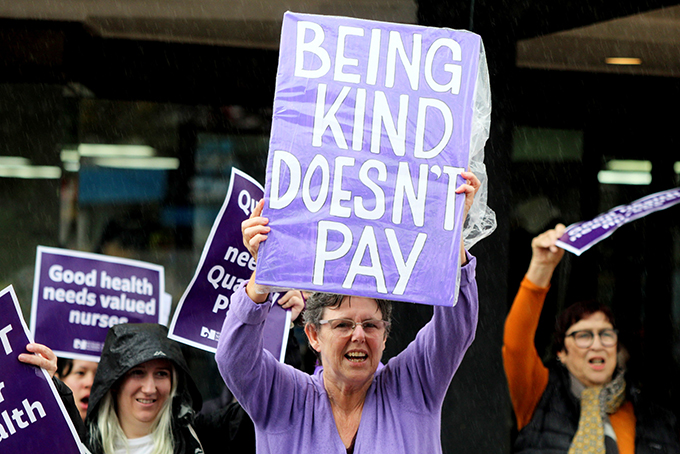Healthcare workers striking for better pay and work conditions along Pollen St in Thames last week donned raincoats instead of scrubs, and placards instead of swipe cards.
The rainy weather on June 9 did not deter the large turnout of Thames Hospital staff and supporters, who dressed in purple and chanted for safe staffing and fair pay.
Those driving by in the warmth of their cars tooted in encouragement, and it was that support which made Thames Hospital senior nurse and New Zealand Nurses Organisation (NZNO) delegate Naera Komene emotional.
“We just want them to know that we care about them, but we need to be cared for too.”
The strike was “very important”, she said.
“We need the DHB to notice our worth.
“We work long hours, we don’t ask to be paid for it often, and we just get on with the job. All of the nurses are in the same boat, and I’m just so happy there are a lot of people supporting us.”
The strike involved nurses, midwives and healthcare assistants at public hospitals and district health board facilities, and came after around 30,000 NZNO members voted to reject the latest offer from DHBs concerning pay, work conditions, and safe staffing.
NZNO organiser Nigel Dawson told The Profile there was a “chronic shortage of nurses” throughout the country.
“Nurses don’t want to strike. They never want to strike. They felt they’ve been forced into this. I think they just feel let down. They feel they are totally undervalued,” he said.
“Everybody’s been affected by this DHB [cyber] hack, but it hasn’t made that much difference [to staffing]. There’s been significant understaffing issues in the DHBs for years, and it’s just getting worse.”
The strike comes after Waikato DHB was crippled by a cyber-attack, in which hackers obtained sensitive data about patients, staff and finances.
According to a recent update by health board chief executive Dr Kevin Snee, the DHB continued to make “good progress” in restoring its technical systems after taking appropriate steps to safeguard against any further cyber-attacks. By KELLEY TANTAU




